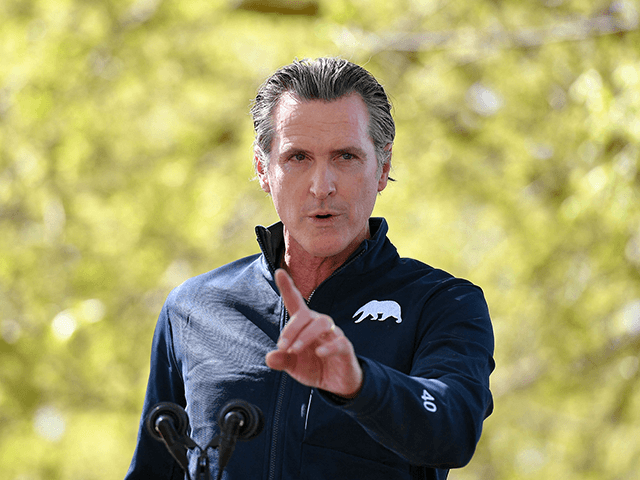The recall election that could eject Democrat California Gov. Gavin Newsom is just days away and farmers are ready to check the “yes” box on the ballot because he has done nothing to deal with water management and instead has hurt their operations by cutting off water supplies in rural parts of the state.
Buddy Mendes is a farmer in Riverdale and a Republican county supervisor. He said he was forced to let hundreds of acres where he used to grow cotton and wheat dry up this season after his allotment of river water was completely cut off.
He’s using groundwater from wells to keep his almond trees alive and while he told the San Francisco Chronicle he hasn’t decided who he will vote for to replace Newsom he said he is a “hell yeah” on removing the governor from office.
“Let’s face it, to Newsom, dam is a four-letter word,” Mendes said. “We haven’t done anything in 20 years about building storage.”
Zack Andrade is another California farmer who is tired of agriculture being targeted with water restrictions while urban areas have multiple sources of water, including the river water they need to run agricultural operations, from livestock to food crops.
The Chronicle reported on the role farmers could play at the ballot box on September 14:
Like many farmers across California, Zack Andrade’s business is being choked by an extraordinary two-year drought. Water cuts could soon erase about a quarter of the irrigation he depends on to grow leafy greens, carrots and beets on his family’s farm in the rolling hills south of Silicon Valley, near Morgan Hill. Andrade said the crisis has been made worse by successive governors, including Gavin Newsom, who he says have punted on damming rivers and building new reservoirs to help California store more water during wet years.
That’s why Andrade says he’s voting to oust Newsom in the Sept. 14 recall election, which he calls a chance to make his frustrations heard. But he admits his decision is less about the governor himself than a cry of exasperation over what he sees as California’s decades-long refusal to prepare for inevitable cycles of drought.
“I’m going to vote my pocketbook. [Newsom] just happens to be the one at the helm right now,” Andrade said. “It’s a vote of ‘no confidence.’”
The Chronicle said these farmers’ sentiments are typical even though the state hasn’t figured out how to manage water during wet seasons so it can be ready for the dry weather that is commonplace in the state, even if environmentalists blame it on so-called climate change.
The Chronicle report continued:
Reducing by too much the amount of fresh water that flows through the Sacramento-San Joaquin River Delta — the estuary that carries snow runoff from the Sierra Nevada — permits salt water to intrude from San Francisco Bay. Salinity threatens water quality in the delta, which supplies fresh water for about two-thirds of California’s population and nourishes the state’s massive agricultural industry. Drought is simultaneously pushing migratory fish species, such as Chinook salmon and steelhead trout, closer to the brink of extinction. Large numbers of fish have died off because the rivers they rely on for spawning habitat are too warm or too low.
Newsom’s supporters defend him as having to fight a battle not of his own making.
“He’s juggling a lot and trying to figure out how to navigate a thicket that has been challenging for every governor that has come before him. It’s important to look at how he’s done in that context,” Felicia Marcus, who was chairwoman of the State Water Resources Control Board during the 2012-2016 drought, said.
Marcus said Newsom and water regulators face the “no-win” task of balancing the needs of agriculture while at the same time protecting the delta and river ecosystem in the state. She said calls for building more dams isn’t the answer.
“You could build all the dams in the world and they would be empty in an extreme drought,” Marcus said. “Beware people that give simple answers to complex problems.”
“Newsom hasn’t mandated water rationing for individual consumers, though he has asked Californians to voluntarily cut consumption by 15 percent and has suggested that statewide restrictions could be needed if conditions worsen heading into the fall,” the Chronicle reported. “The governor has recently touted a series of actions to help the state confront a potential third year of drought.”
Last month, Newsom signed a state budget that included $5.1 billion over four years for new water infrastructure and drought preparation projects, including repairing delivery canals, helping farmers irrigate crops more efficiently, and to put water-recycling projects in place.
But California water regulators ordered 4,500 farmers, water districts, and other landowners last month to stop drawing water from rivers in the sprawling Sacramento River and San Joaquin River watersheds.
“The unprecedented move hits agriculture the hardest because most cities have alternative supplies or stored water to tap into,” the Chronicle reported.
But at least two Republicans who hope to replace Newsom are saying they have better solutions to help the farmers who grow much of the food the nation consumes.
Kevin Faulconer, a former mayor of San Diego, released a six-point proposal that includes building more reservoirs and water-storage systems. He also said he would appoint new leaders to the Water Board and other state agencies who “are supportive of agriculture and non-urban communities.”
“Leadership is not about when it’s a drought coming out, year after year, and saying the solution is take shorter showers,” Faulconer told the Chronicle at a recent campaign stop. “We need to increase the supply.”
Larry Elder, a popular conservative radio host and Republican front-runner in the race, said “drought is not inevitable” and said he wants to put desalination projects in place as well as building more reservoirs to store runoff water.
Follow Penny Starr on Twitter or send news tips to pstarr@breitbart.com.

COMMENTS
Please let us know if you're having issues with commenting.